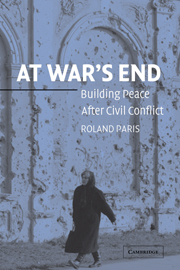Book contents
- Frontmatter
- Contents
- List of Figures
- Preface
- Introduction
- PART I FOUNDATIONS
- PART II THE PEACEBUILDING RECORD
- 3 Introduction to the Case Studies
- 4 Angola and Rwanda: The Perils of Political Liberalization
- 5 Cambodia and Liberia: Democracy Diverted
- 6 Bosnia and Croatia: Reinforcing Ethnic Divisions
- 7 Nicaragua, El Salvador, and Guatemala: Reproducing the Sources of Conflict
- 8 Namibia and Mozambique: Success Stories in Southern Africa?
- PART III PROBLEMS AND SOLUTIONS
- Conclusion
- Bibliography
- Index
3 - Introduction to the Case Studies
Published online by Cambridge University Press: 05 September 2012
- Frontmatter
- Contents
- List of Figures
- Preface
- Introduction
- PART I FOUNDATIONS
- PART II THE PEACEBUILDING RECORD
- 3 Introduction to the Case Studies
- 4 Angola and Rwanda: The Perils of Political Liberalization
- 5 Cambodia and Liberia: Democracy Diverted
- 6 Bosnia and Croatia: Reinforcing Ethnic Divisions
- 7 Nicaragua, El Salvador, and Guatemala: Reproducing the Sources of Conflict
- 8 Namibia and Mozambique: Success Stories in Southern Africa?
- PART III PROBLEMS AND SOLUTIONS
- Conclusion
- Bibliography
- Index
Summary
Has the Wilsonian assumption of peacebuilding – that rapid liberalization would foster a stable and lasting peace in countries that are just emerging from civil wars – been borne out in practice? How should we go about answering this question? This chapter sets out the investigative framework for the case studies that follow. Specifically, I shall address three issues: First, what are the specific causal hypotheses that will be evaluated against the record of peacebuilding? Second, how will the case studies of peacebuilding missions be structured in order to evaluate these hypotheses? Third, which particular peacebuilding missions will be studied?
Most studies of peacebuilding outcomes begin by establishing a standard of effectiveness or success and then proceed to evaluate the record of one or more operations against this standard. My aim is slightly different: to examine whether the strategy of peace-through-liberalization, in particular, has enhanced the prospects for stable and lasting peace in countries that have hosted peacebuilding missions. Put differently, the “independent variable” that I am interested in studying is political liberalization (including the establishment of political and civil freedoms, and preparations for and the holding of elections) and economic liberalization (including the movement toward market-oriented economic policies and practices), while the “dependent variable” is the likelihood of stable and lasting peace within the host country.
- Type
- Chapter
- Information
- At War's EndBuilding Peace after Civil Conflict, pp. 55 - 62Publisher: Cambridge University PressPrint publication year: 2004



